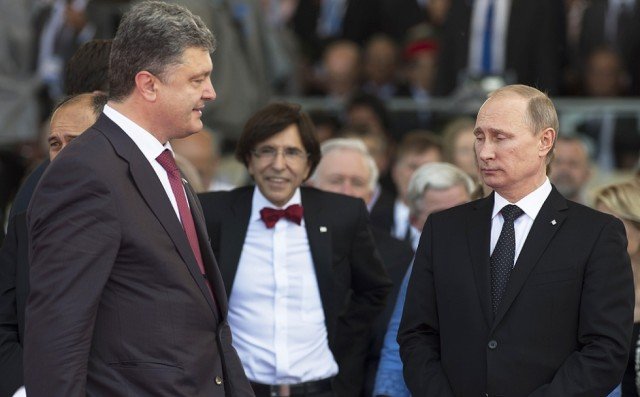
Ukraine announces that President Petro Poroshenko has agreed with Russian President Vladimir Putin by phone on a “cease-fire process” for the east.
His office initially reported that a “permanent cease-fire” had been agreed but later revised its statement.
The Kremlin stressed Vladimir Putin had not agreed to a cease-fire as Russia was not party to the conflict.
President Barack Obama has expressed solidarity with Baltic member-states of NATO on a visit to Estonia.
Barack Obama is in the Estonian capital Tallinn with President Toomas Hendrik Ilves of Estonia and the leaders of Latvia and Lithuania, all former Soviet states which joined NATO a decade ago.
A NATO summit opening in Wales on September 4 is expected to back plans for a rapid response force.
Meanwhile, the rebels in Ukraine’s eastern regions of Donetsk and Luhansk have said that there can be no cease fire until the government withdraws its forces.
The earlier version of the statement on the Ukrainian presidential website read: “Their conversation resulted in agreement on a permanent cease-fire in the Donbass region [the regions of Donetsk and Luhansk].”

However, this has now been changed to: “Their conversation resulted in agreement on a process for ceasing fire in the Donbass region.”
The statement adds that Petro Poroshenko and Vladimir Putin “reached a mutual understanding on steps leading to peace”.
In its statement, the Kremlin said a phone conversation had taken place on September 3 between the two presidents in which their points of view had “coincided significantly” on possible ways to end the crisis.
President Vladimir Putin’s spokesman, Dmitry Peskov, clarified for Russian news agency RIA Novosti: “Putin and Poroshenko did not agree a cease-fire in Ukraine because Russia is not party to the conflict, they only discussed how to settle the conflict.”
A rebel spokesman told the same agency the rebels did not believe Petro Poroshenko was in complete control over Ukrainian forces in the east.
A spokeswoman for EU Foreign Policy chief Catherine Ashton said that work on new sanctions against Russia was continuing because the cease-fire had not been confirmed.
More than 2,600 civilians and combatants have been killed and more than a million people have fled their homes since fighting erupted in eastern Ukraine in April, when pro-Russian separatists there declared independence.
Russia has denied accusations by the West and the Ukrainian government that it is sending troops and military equipment over the border to support the separatists, who recently gained the upper hand against government forces.